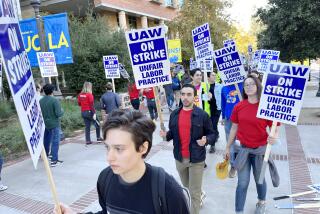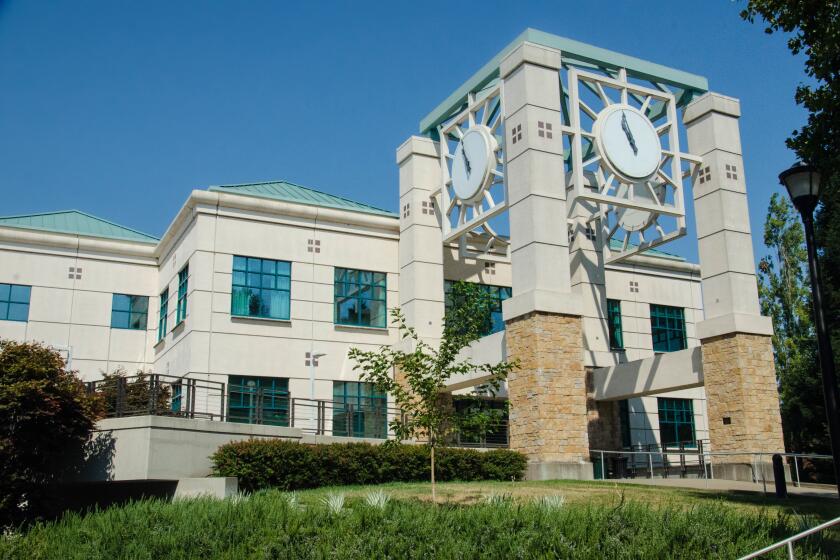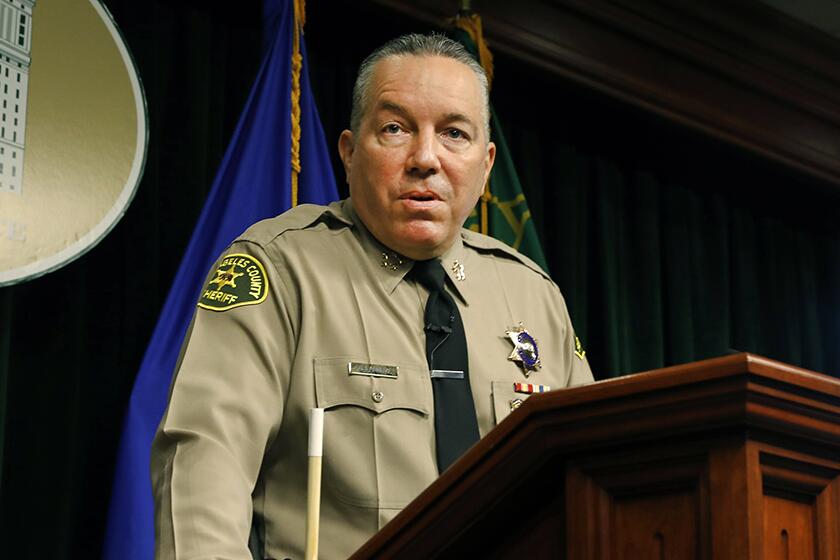Prince of the City : After 30 years in the cabbie trade, Socks Cadden knows L.A. better than most of us. He also knows when it’s time to shift into life’s slow lane.
His real name is Clarence Cadden, but nobody calls him that. Back when he was staying in flophouses on skid row, a woman known as Smooth Stick Walker assigned him a nickname, “Socks,” and it stuck.
For 20 years and 1.75 million miles, Socks drove a cab, long enough and far enough to develop an intimate relationship with the Southland and its people. He knows the streets in a way few of us ever will and has concluded that Los Angeles remains the greatest city in the world.
“We’ve got everything from culture to vice, and we’ve got the best of all of it.”
In all, he has spent 30 years in the cab business, but this week was his last. He’s taking down his treasure chest of photographs showing him shoulder to shoulder with former NFL quarterback Jim Plunkett, smiling women in Budweiser swimsuits, L.A. Raider cheerleaders.
But it’s more than pictures that will be removed with his retirement. At 61, Socks is a throwback to a lost era. When he was driving, you were assured of more than a taxi: You got a storyteller, a beer hall philosophy, service with a smile. And always, a glassy smooth ride.
He has driven for stars and in films, in funeral processions--some for people, some for pets.
Ten years ago, having grown weary of the stress of professional driving, he took an office job with Babaeian Transportation, doing business in Burbank as Checker Cab. Since then, he has been training new drivers, teaching CPR, fiddling around on the computer, running errands.
He is leaving the city he loves to retire in Las Vegas, where the rent and prime rib are less expensive. He would have preferred working until September, when he receives his first Social Security check, but with new owners taking over the business, maybe now is better.
The business has changed all around him, and sometimes he feels left behind. He shakes his head as he sits behind his desk next to a computer, an instrument with which he has developed a tentative relationship. He was more comfortable behind the wheel.
“It used to be when a person drove a cab for any length of time--a year, two years--they were professional drivers,” he says as he fires up one of about 90 Lucky Strikes he smokes daily.
He describes how it was part of the job to open doors, carry groceries to the front door, extend his elbow for the elderly to grasp as he walked them to and from the cab. Common courtesy, he calls it.
“You got a lot of people out there driving cabs who aren’t cab drivers,” he says, exhaling.
And you’ve got people out there who don’t know how to make a right on red or a left on green and they’re always in a hurry.
“Tailgating is my pet peeve,” Socks notes, then explains the importance of being circumspect, allowing one car length for every 10 mph.
Tony, an associate of Socks’ who prefers to be known as just Tony, looks out through the office window at a cab with a bashed fender from the night before.
“You know what happens,” he says. “They rush around. They go pick up their [expletive] pork chop, their $6 pork chop and they don’t give a [expletive] who’s in their way.”
“That’s right,” says Socks, leaning back in his chair.
“Or a $10 pork chop, right? You know what I mean? ‘Oh, I gotta make that money, I gotta get back, I gotta make that money.’ The $6 customer you’re racing to at [expletive] 45 miles an hour, you’re going to have to wait for ‘em when you get there anyway.”
“There’s only one rule, and that’s safety,” Socks says.
“There’s safety, there’s safety and there’s safety,” Tony adds.
OK, so maybe there are three rules, none of them apparently evidenced by the crushed fender, which in the minds of two old-timers seems to represent something lost to a world of iconoclasts. It seems like something important is missing not merely from the cab business or the streets but from life in general.
Maybe it’s a good time to retire.
*
Socks was sitting in a bus depot in Seattle one day, wondering what to do with his life. His 5-year marriage was over. He had sold his interest in an auto parts warehouse distribution business. The money went to a lump sum child support settlement.
It was February 1965 and bitterly cold.
Socks, who was born in Vancouver, British Columbia, met his wife at a wedding reception. He had been at another wedding only to discover that liquor was not being served at the reception, so he and a buddy decided to head for wetter pastures.
“She was cute,” he says, “blond hair, 5-3 or 5-4, nice figure, brown eyes, nice legs.”
He asked her to dance.
“I don’t dance,” she said, “I drink.”
Right away he knew. “She was my kind of lady.”
After the reception, they headed out in his 1951 Pontiac Chieftain convertible--canary yellow. Twenty-eight days later, they were married. Her father, Dirty Louie, was a cab driver and commercial fisherman. She and Socks had three sons.
Socks put in long hours at work. He went on a business trip to Spokane once and when he returned home, his wife had left him. He didn’t even realize it until the next day.
So, he was sitting in the bus depot, and someone left a newspaper next to him. He picked it up and came across the weather report. He noticed it was nearly 80 degrees in L.A.
So, L.A. it was.
He bought a one-way ticket and had $70 left over, nothing else except the clothes he was wearing. He never saw his wife again, never saw two of his three sons.
It took a good 10 years before he stopped thinking about them daily, another five years or so before he stopped thinking about them two or three times a week. Even now, perhaps especially now, he misses them. In his memory, his children have not aged, and Socks is still a young man.
His wife remarried and had more children. Socks says he wanted his sons to be raised by one father, and since it wasn’t going to be him, he never went back. Some guys, he says, are just meant to be bachelors, and he figures he’s one of them.
The first thing he did when he arrived in L.A. was pick up a newspaper and get his loafers shined. He scouted around for a job, but it took some time, so he stayed in buck-and-a-half all-night movies or coffee shops, rented a room on skid row when he managed to make a couple bucks by selling blood, handing out handbills or finding work through the “slave market.”
He learned to live on next to nothing and always wore white socks, so if one of them developed a hole, the other was easily mated. He found temporary work at a warehouse and with his first check went out and bought a fire engine red shirt with matching socks.
That night when he walked into the Golden Gate Cafe in downtown, a woman named Beverly, nicknamed “Smooth Stick” for her prowess with a pool cue, looked at him and said, “Hey, look at the socks.”
Smooth Stick gave everyone nicknames: Messy Haired Leo, Shoplifting Shorty, Sneaky Pete, Benny the Bookie, Two-Fingered Mike.
And, finally, Socks.
“Everybody loved Beverly. Her dream was to create a mission-type thing where guys coming in off the rail could get cleaned up and get something to eat without having to listen to all that religious jazz at the missions,” Socks says.
The last time he saw Smooth Stick, she was riding the rails, headed for Chicago with a guy named One-Eared McFadden.
*
In 1966, he began driving for L.A. Yellow Cab. It was just a job, but over time he began to take it seriously.
“We were cab drivers, we were professional cab drivers, and we were proud of it. A professional cab driver is not going to take you the long way around. He’s going to give you a smooth, safe comfortable ride. He’s going to charge you a fair price. He’s going to open the door for you. He’s going to put your luggage or groceries in front of your house, and he’s going to treat you with courtesy. Nowadays, everything’s changed.”
From his vantage point behind the wheel, he learned a lot about the city, its ethos and its people. Some students go to college to learn psychology, he says, but he got an education driving a cab.
“People have changed all over the city. It’s the attitude. Instead of being part of the city, there’s a lot more class distinction, more ethnic distinction. It used to be one city, and now it’s divided into half a dozen or more categories.”
People, he says, have become more self-serving. Nobody cares anymore. Everyone looks out for No. 1.
“I never figured I was No. 1,” he says. “I tried to analyze it one day, and I think I came in something like No. 7 or 8 or 9 on the scale of what’s important.”
Throughout his career, he was particularly drawn to the street light solitude of city nights, when there were fewer people about, less traffic, more adventure in the air. The city seemed more his own in the softness of nocturnal air blowing in through his window.
“Sometimes there’s no one out there but cops, crooks and cab drivers,” he says. “You stop for coffee and you see cops having coffee and drug dealers having coffee and cab drivers having coffee before everybody goes home.”
Hollywood eventually found Socks, and he worked as an extra in everything from an after-school special to a porno flick. He drove a cab in “Exorcist II” and “California Suite.”
He delivered Jack Benny from the Century Plaza Hotel to his apartment once. It was a $1.20 fare, and Benny gave him $2, then went through his whole shtick, holding his hand out for change and glancing away.
Socks dug through his pockets and gave him his change. Benny smiled and tipped him $5.
Then there was Robert Vaughn, “the only guy I came close to hitting.” Vaughn, according to Socks, was overly demanding and finally threw his weight around by saying the one thing Socks hates to hear: “Do you know who I am?”
“One thing you learn as a cab driver,” Socks says, “is patience.”
He twice saw former L.A. Laker Wilt Chamberlain climb into the cab ahead of him at LAX. To see him fold his towering frame into the back seat was a bit of “poetry in motion.”
Socks has two greatest thrills in the taxi cab business. One was spotting boxer Archie Moore at the Biltmore.
“I shook his hand, and I say, “How ya doin’ champ? Geez, you’re really looking good.’ ” Moore smiled as he shook Socks’ hand, said thank you then quietly walked away.
Another time, he saw a familiar face in the luggage area at Union Station. “He makes eye contact with me, and I smile. He smiles, and I say, ‘Jesus Christ, Sugar Ray Robinson.’ I shook his hand. I’ve met a lot of celebrities, but shaking hands with Archie Moore and Sugar Ray Robinson, man--that’s something.”
*
For Socks, a new life in a new city will require a new routine. No longer will he be stopping by Harry’s for coffee at 6 a.m. When you drive a cab, you learn about restaurants, which places offer endless cups of coffee and a good Swiss steak at 5 in the morning.
He will have to find a replacement for his Burbank watering hole, where he is a member of the Mugger’s Club, affording him a 35-ounce brew for $2.50.
“It’s a gold mine,” he says.
He doesn’t sip, he drinks. He doesn’t drive drunk, doesn’t drink at home. But he can hold down a bar stool with the best of them.
“For me, it’s more a social thing,” he says. “I’m just as comfortable in a high class bar as a sleazy bar. I’ve always been able to adjust to the environment.”
So maybe Vegas won’t be so tough of an adjustment. He’s been known to put a few bucks down on a game or two. Beyond drinking, smoking and gambling, he has other interests. He enjoys golf but his primary qualification for the game is that he owns a set of clubs.
He visits museums and ballparks. He has soaked in jazz at the Hollywood Bowl and can close his eyes and hear La Traviata performed by the New York Opera Co. He can offer a discussion and hyperbole on just about anything, from the great ones who have worn Dodger blue to kids these days to the gardyloo of politicians.
“I love it all, every aspect of life. I love people, I love watching people. It’s like watching a parade.”
As he views his career in a rearview mirror, he feels fortunate that he was never injured or robbed, primarily due to circumspect driving and facile instincts that told him when “to roll up the windows and get the hell out of here.”
Others, however, were not as fortunate. He has arrived at work too many days and seen the blood-stained seats where comrades fell, a sign on the car ordering that it be saved for fingerprints.
“One guy,” he says, “got killed over on Wall and 22nd for $5.”
Not many of the old-timers are still around. Like Socks, the glasses get thicker, the braking distance a little longer. The tightness in the shoulders increases after a long shift on the road. Life changes.
“Socks is a dying breed,” says Rick Ward, operations manager for Yellow Cab in L.A. “He represents a time when people took pride in their work, in a job well done. He always treated people with respect: ‘yes sir,’ or ‘no ma’am.’ We try to instill those things in drivers now, but it doesn’t have the same meaning.”
Socks will go down as one of the legends in the business, Ward says, a gentleman with a few rough edges, a guy you could count on for a pleasant chat, the spread on the game or a tip on restaurants that serve a nice Swiss steak.
And, always, a smooth ride.
More to Read
Start your day right
Sign up for Essential California for news, features and recommendations from the L.A. Times and beyond in your inbox six days a week.
You may occasionally receive promotional content from the Los Angeles Times.






